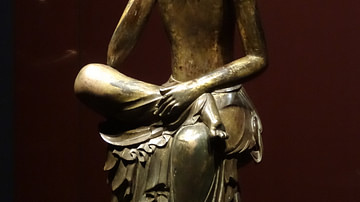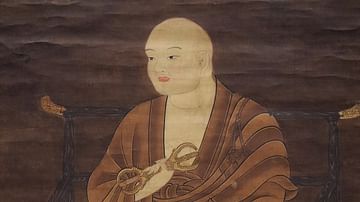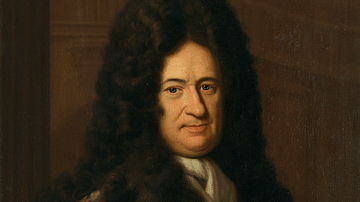Search
Search Results

Article
Zen Buddhism in Ancient Korea
Buddhism was introduced from China to ancient Korea in the 4th century BCE and adopted as the official state religion by the Kingdoms of Baekje, Goguryeo, and Silla. The faith split into separate divisions across Asia, one of the most important...

Interview
Interview: Kutuzov a Life in War and Peace by Alexander Mikaberidze
Join World History Encyclopedia as they have a chat with author Alexander Mikaberidze all about his new book Kutuzov: A Life in War and Peace, published by Oxford University Press. Kelly: Thank you so much for joining me today, Alex. It...

Definition
Siddhartha Gautama
Siddhartha Gautama (better known as the Buddha, l. c. 563 - c. 483 BCE) was, according to legend, a Hindu prince who renounced his position and wealth to seek enlightenment as a spiritual ascetic, attained his goal and, in preaching his path...

Definition
Tara
Tara is a female deity in both Hinduism and Buddhism who personifies compassion and offers salvation from the suffering of rebirth and death. She is thought to have been born of empathy for the suffering world and is regularly invoked for...

Definition
Kabbalah
The term Kabbalah refers specifically to the form of Jewish mysticism that became widespread in the Middle Ages. However, in recent decades it has essentially become a generic term for the entirety of Jewish mystical thought. Literally meaning...

Definition
Edmund Burke
Edmund Burke (1729-1797) was an Anglo-Irish statesman and political thinker. His most famous work is Reflections on the Revolution in France a critique of the social and political turmoil in that country in the final decade of the 18th century...

Definition
Kukai - Japan's Founder of Shingon Buddhism
Kukai or Kobo Daishi (774-835 CE) was a scholar, poet, and monk who founded Shingon Buddhism in Japan. The monk became the country's most important Buddhist saint and has been credited with all manner of minor miracles. Noted as a gifted...

Definition
Gottfried Wilhelm Leibniz
Gottfried Wilhelm Leibniz (1646-1716) was a German polymath who became well-known across Europe for his work, particularly in the fields of science, mathematics, and philosophy. Leibniz's rationalist philosophy attempted to reconcile traditional...

Article
Declaration of Independence
The Declaration of Independence is the foundational document of the United States of America. Written primarily by Thomas Jefferson, it explains why the Thirteen Colonies decided to separate from Great Britain during the American Revolution...

Article
Declaration of the Rights of Man and of the Citizen
The Declaration of the Rights of Man and of the Citizen (French: Declaration des Droits de l’Homme et du Citoyen) is a human rights document adopted in the early stages of the French Revolution (1789-1799). Inspired by Enlightenment Age principles...